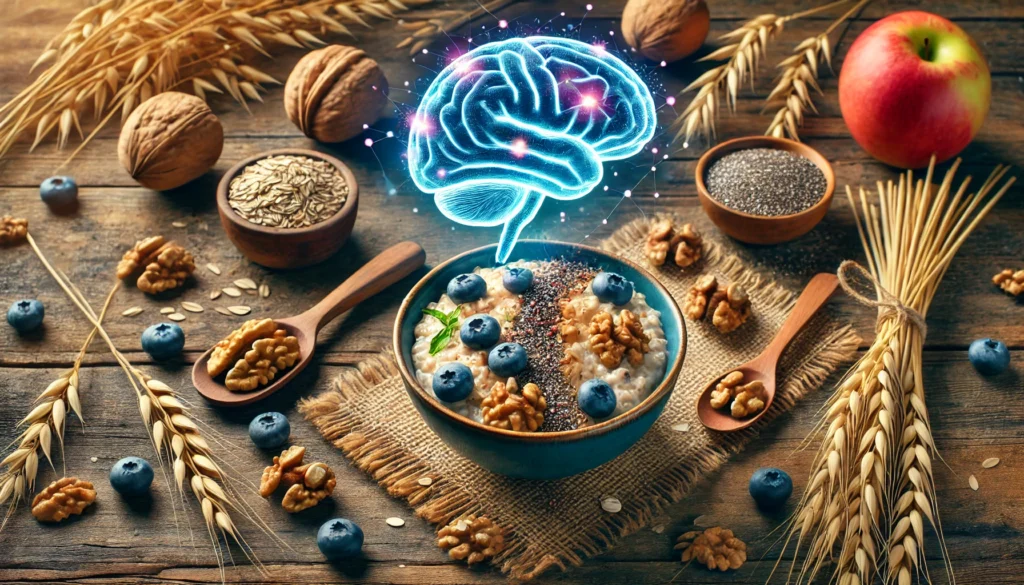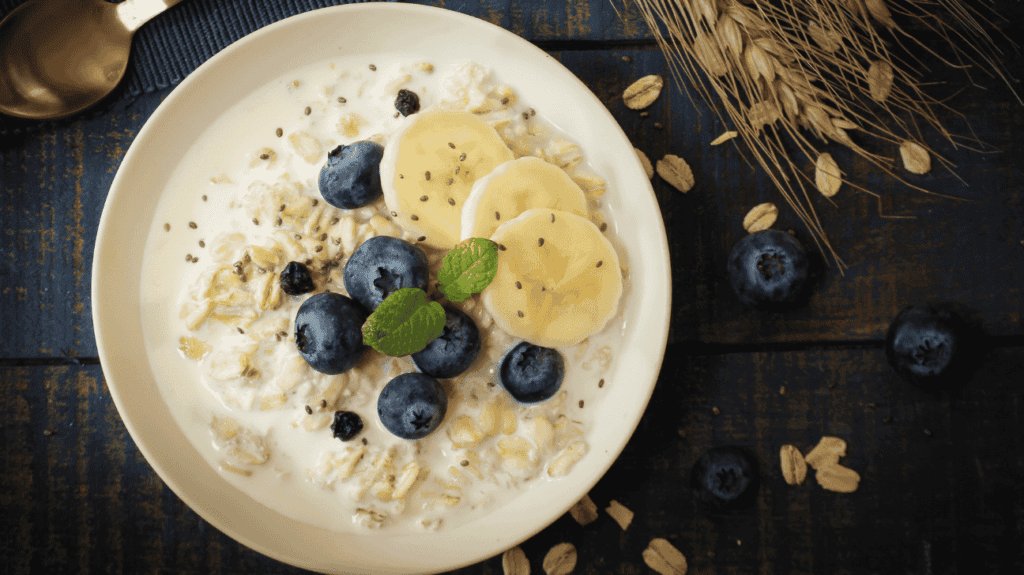Oats (Avena sativa) have long been a dietary staple and are increasingly recognized for their potential as a nootropic supplement. Best known for their high fiber content and nutritional value, oats contain bioactive compounds with positive effects on cognitive health. Recent research highlights oats’ nootropic potential, particularly their ability to enhance cognitive function, mood, and memory. This article explores the chemistry, mechanisms, dosage, side effects, interactions, and safe use of oats as a nootropic supplement.
You May Also Like:
Oats: Potential Nootropic Benefits, Dosage, Side Effects, Interactions and Other Important Information About This Supplement is an original (NootropicsPlanet) article.
Sources of Oats
Oats are typically consumed in whole, rolled, or steel-cut form, with oat-based products like oat milk, oatmeal, and oat bran also popular. They are a rich source of:
- Beta-glucans: These soluble fibers are known for improving heart health and blood glucose control, both of which can indirectly benefit cognitive health by stabilizing energy levels.
- Avenanthramides: Unique polyphenolic compounds in oats, avenanthramides have anti-inflammatory and antioxidant properties that protect against oxidative stress, a factor in cognitive decline.
- Vitamin B1 (thiamine): Essential for energy metabolism, thiamine supports brain function by aiding in glucose metabolism, which fuels neuronal activity.
- Minerals like magnesium, iron, and zinc: These minerals play a role in neurotransmitter synthesis and neuronal health, contributing to overall brain function and resilience against stress.
While oats are typically included in a balanced diet, their unique compounds and benefits for cognitive health make them a candidate for more focused nootropic use.

Chemistry of Oats
The primary active compounds in oats contributing to nootropic effects include avenanthramides, beta-glucans, and several B vitamins.
- Avenanthramides are phenolic alkaloids unique to oats, contributing to their anti-inflammatory and antioxidant effects. Chemically, avenanthramides contain hydroxyl groups that combat oxidative damage by neutralizing free radicals, reducing oxidative stress in brain tissue.
- Beta-glucans are polysaccharides that form a gel-like substance in the digestive system, slowing the release of glucose into the bloodstream. By stabilizing blood glucose levels, beta-glucans may improve mental clarity and focus, preventing the cognitive dips associated with fluctuating energy levels.
- Thiamine (Vitamin B1) is vital in cellular energy production, especially in the brain, where it supports the conversion of glucose into energy. Thiamine deficiency has been linked to cognitive decline, indicating that this nutrient is crucial for maintaining optimal brain function.
Physiological Mechanisms of Oats in the Body and Brain
The bioactive compounds in oats contribute to cognitive enhancement through several mechanisms:
- Anti-Inflammatory and Antioxidant Effects: The antioxidant properties of avenanthramides protect the brain from oxidative stress, which contributes to cognitive aging and neurodegenerative diseases. By reducing oxidative stress, oats may slow cognitive decline and support long-term brain health.
- Blood Glucose Stabilization: The beta-glucans in oats slow digestion and the absorption of carbohydrates, providing a steady release of glucose. This stabilization of blood sugar levels helps to maintain mental energy and reduce the likelihood of fatigue, improving focus and concentration.
- Mood and Stress Regulation: Regular oat consumption can have calming effects, partly due to the magnesium content, which promotes GABA (gamma-aminobutyric acid) production. GABA is an inhibitory neurotransmitter that helps regulate mood, reduce anxiety, and promote relaxation, supporting emotional resilience under stress.
- Support for Neurotransmitter Synthesis: The presence of zinc, magnesium, and B vitamins in oats aids in the synthesis of dopamine and serotonin, neurotransmitters involved in mood regulation, memory, and cognition. Magnesium, in particular, plays a crucial role in synaptic plasticity, which is essential for learning and memory formation.
Promote sharper thinking and long-term brain wellness with Oats —Invest in yourself, Buy Today!

Nootropic Benefits of Oats
Oats offer several potential nootropic benefits, supported by research and linked to the key bioactive compounds described above:
- Improved Cognitive Performance and Focus: Due to their effect on blood glucose stabilization, oats can support sustained mental energy, which is essential for focus, learning, and decision-making. Stable glucose levels reduce the cognitive impairment caused by hypoglycemia, improving attention and concentration. Consuming oats regularly can help maintain mental clarity throughout the day, especially during tasks that require prolonged focus.
- Enhanced Mood and Stress Management: Magnesium and avenanthramides in oats contribute to mood stabilization and reduction in stress response. The calming effects of magnesium can reduce symptoms of anxiety and enhance relaxation, which is beneficial for overall cognitive performance. This calming influence may also lead to improved sleep quality, further supporting mood stability and mental health.
- Neuroprotection Against Cognitive Decline: Oats’ antioxidant effects, particularly those of avenanthramides, protect neurons from oxidative stress and inflammation, which are linked to aging and neurodegenerative diseases. Regular oat consumption may support long-term brain health and protect against memory decline. This neuroprotection is especially valuable in preserving cognitive abilities as individuals age, potentially reducing the risk of conditions like Alzheimer’s.
- Support for Memory and Learning: B vitamins, especially thiamine, play a key role in neurotransmitter function, synaptic plasticity, and neuronal health. By supporting the biochemical pathways involved in learning and memory, oats may help improve cognitive retention and adaptability. Additionally, the enhanced neurotransmitter function can make information processing faster, benefiting tasks that require quick thinking and recall.

Dosage and Supplementation Guidelines
For nootropic purposes, oats can be included in the diet or consumed in supplement form, such as oat straw extract or concentrated oat bran.
- Dietary Inclusion: Regular consumption of oats (around 30–50 grams per day, or approximately one serving of oatmeal) can provide nootropic benefits, especially when consumed as part of a balanced diet.
- Oat Straw Extract: Oat straw (Avena sativa) extract is a concentrated form of oat compounds and has been studied for its effects on cognitive function. Common doses range from 300–600 mg per day, though individuals should start at the lower end and consult with a healthcare professional before adjusting dosages.
- Oat Bran Supplements: Oat bran contains higher concentrations of beta-glucans and is available in capsule form. Typical doses range from 500–1,000 mg daily, taken with water to support digestion and absorption.
It is important to note that the bioavailability of active compounds like avenanthramides may vary depending on the form and source of the oats. Consulting with a healthcare provider can help determine the most appropriate form and dosage based on individual health and cognitive goals.
Side Effects and Safety
Oats are generally well-tolerated, but individuals considering oats for nootropic use should be aware of possible side effects, particularly when using concentrated supplements.
- Gastrointestinal Distress: Due to the high fiber content, some people may experience bloating, gas, or stomach cramps, especially if they consume large amounts of oats or have a fiber-sensitive digestive system. Gradual introduction and increased water intake can mitigate these effects.
- Allergic Reactions: Though rare, some individuals are allergic to oats or may have a cross-reactive response if they are also allergic to other grains, particularly wheat. Those with known allergies to gluten should look for gluten-free oat options.
- Blood Sugar Effects: While beta-glucans help stabilize blood glucose, individuals with hypoglycemia or diabetes should monitor blood sugar levels to ensure stability when consuming oats as part of their regimen.

Interactions with Other Supplements and Medications
Oats are relatively safe but may interact with certain supplements and medications:
- Antidiabetic Medications: Due to the blood glucose-lowering effect of beta-glucans, individuals taking antidiabetic drugs (e.g., insulin or metformin) should monitor blood glucose levels when consuming oats to prevent hypoglycemia.
- Laxatives and Fiber Supplements: The high fiber content in oats may increase the effects of other fiber supplements or laxatives, possibly leading to digestive discomfort. Those combining multiple fiber sources should balance intake to avoid excessive gastrointestinal distress.
- Calcium and Magnesium Supplements: Oats contain phytic acid, an antinutrient that can bind minerals like calcium and magnesium, reducing their absorption. Individuals taking mineral supplements may want to consume oats separately from mineral-based supplements or opt for oats with lower phytic acid content (e.g., sprouted oats).
- Nootropic Stimulants (e.g., Caffeine): Combining oats with stimulants like caffeine can enhance focus and mental clarity without significant side effects. However, excessive caffeine combined with oat-based supplements may lead to jitteriness or overstimulation, so moderation is advised.
Risks for Individuals with Certain Health Conditions
Oats are typically safe for most people, though certain health conditions may warrant caution:
- Celiac Disease and Gluten Sensitivity: Although oats are naturally gluten-free, they are often processed in facilities that handle wheat, increasing the risk of cross-contamination. Gluten-free certified oats are recommended for individuals with celiac disease or gluten sensitivity.
- IBS and Other Digestive Disorders: High-fiber foods like oats can sometimes exacerbate symptoms in individuals with irritable bowel syndrome (IBS) or other digestive disorders. Those with fiber-sensitive digestive systems may benefit from starting with small portions of oats and gradually increasing intake.
- Kidney Disease: Due to the phosphorus content in oats, individuals with chronic kidney disease should monitor oat intake, as excessive phosphorus can affect kidney function. Consulting with a healthcare provider can help determine appropriate oat consumption for those with kidney concerns.
Conclusion: Should You Consider Oats as a Nootropic?
Oats offer a range of nootropic benefits due to their unique combination of fiber, avenanthramides, B vitamins, and minerals that support cognitive health, mood, and focus. While oats alone may not produce dramatic effects, regular consumption as part of a balanced diet or as a concentrated supplement can offer subtle, sustainable cognitive support. The antioxidant and anti-inflammatory properties of oats also provide a layer of neuroprotection that supports long-term brain health.
For individuals seeking natural ways to enhance mental clarity, reduce stress, and support overall brain health, oats are a versatile, accessible, and research-backed option. Those interested in optimizing their cognitive performance through dietary means may find oats to be a valuable addition to their nootropic regimen.

References:
- 9 Health Benefits of Eating Oats and Oatmeal. Retrieved from: https://www.healthline.com/nutrition/9-benefits-oats-oatmeal
- What are the benefits of oatmeal? Retrieved from: https://www.medicalnewstoday.com/articles/324176
- Health Benefits of Oats. Retrieved from: https://www.health.com/oats-benefits-8660530
- Oats 101: Nutrition Facts and Health Benefits. Retrieved from: https://www.healthline.com/nutrition/foods/oats
- Oats – Uses, Side Effects, and More. Retrieved from: https://www.webmd.com/vitamins/ai/ingredientmono-814/oats
Important Note: The information contained in this article is for general informational purposes only, and should not be construed as health or medical advice, nor is it intended to diagnose, prevent, treat, or cure any disease or health condition. Before embarking on any diet, fitness regimen, or program of nutritional supplementation, it is advisable to consult your healthcare professional in order to determine its safety and probable efficacy in terms of your individual state of health.
Regarding Nutritional Supplements Or Other Non-Prescription Health Products: If any nutritional supplements or other non-prescription health products are mentioned in the foregoing article, any claims or statements made about them have not been evaluated by the U.S. Food and Drug Administration, and such nutritional supplements or other health products are not intended to diagnose, treat, cure, or prevent any disease.


